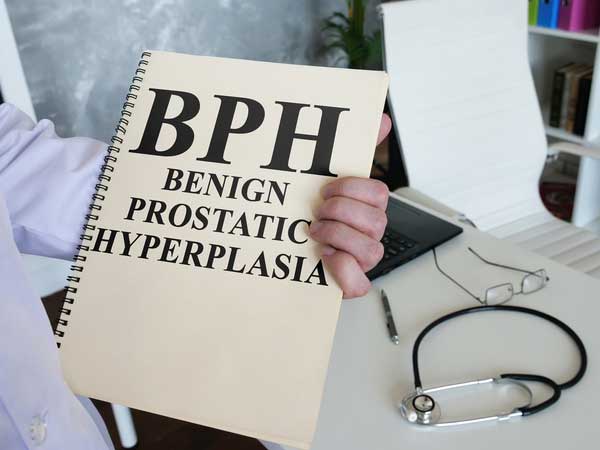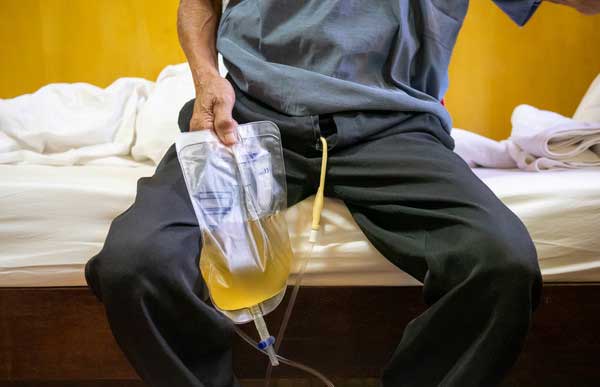Benign prostatic hyperplasia (BPH), commonly known as an enlarged prostate, is a common condition affecting over 70% of men aged 60 and above. BPH involves the non-cancerous enlargement of the prostate gland leading to problematic urinary symptoms like weakened urine flow, incomplete bladder emptying and post-urination dribbling. Fortunately, herbs and natural remedies can help reduce BPH symptoms and support overall prostate health.

In this article, we will discuss the top 5 herbs that can aid in the treatment of an enlarged prostate and improve prostate health:
1. White Button Mushrooms
White button mushrooms contain compounds that help regulate hormonal irregularities, a major cause of prostate enlargement. These compounds specifically target the reduction of DHT levels, a potent form of testosterone linked to prostate growth. By lowering DHT production, white button mushrooms can effectively shrink the prostate back to its normal size. This reduction is key in relieving urinary problems like weak urine flow and feeling like the bladder isn’t fully emptying.
Furthermore, white button mushrooms have powerful anti-inflammatory properties that are important in decreasing inflammation around the prostate area. Inflammation worsens BPH symptoms and increases the risk of developing the condition. The anti-inflammatory attributes of these mushrooms help reduce discomfort and swelling in the prostate, lowering the chances of BPH.
When considering white button mushrooms for BPH treatment, it’s important to view them as part of a holistic prostate health approach. They serve as a natural remedy that not only relieves existing symptoms but also aids in prevention. Adding these mushrooms to one’s diet could be beneficial for overall prostate health.
2. Pumpkin Seed Oil
Pumpkin seed oil, rich in phytosterols, offers many benefits for managing BPH symptoms. These plant-based compounds promote prostate health by significantly reducing inflammation in the prostate gland. Lowering inflammation provides relief from discomfort and improves urinary function, which is often impaired in BPH patients.
Furthermore, limiting DHT production is another key advantage of pumpkin seed oil. By reducing levels of this hormone linked to prostate growth, the oil helps shrink prostate size. The oil also contains antioxidant and anti-inflammatory compounds like vitamin E, carotenoids and polyphenols. These all work together to decrease swelling and discomfort in the prostate, leading to better urinary function and reduced BPH symptoms.
Studies indicate pumpkin seed oil also has positive effects on bladder function, which is helpful for those with BPH experiencing urinary urgency and frequency. It aids urine flow, making it easier to fully empty the bladder and providing relief.
Passionflower Tea
Passionflower tea provides unique benefits for managing BPH symptoms. It contains chrysin, a bioactive compound with anti-inflammatory effects that are key in reducing BPH-related inflammation and discomfort.
Additionally, passionflower has muscle relaxing properties that aid in relaxing the smooth muscle tissue surrounding the prostate gland. This relaxation helps decrease the discomfort and difficulty with urination that BPH patients often experience.
Beyond its specific effects on BPH, passionflower is also known for its calming properties traditionally used to treat anxiety. Prolonged stress and anxiety can worsen BPH symptoms, so passionflower’s calming effects may offer indirect BPH relief by reducing stress-related exacerbation.
Lemons and Citrus Fruits
Lemons and citrus fruits contain antioxidant and anti-inflammatory compounds like vitamin C, hesperidin and naringin. These properties provide an effective defense against BPH development and progression.
The antioxidant and anti-inflammatory attributes of citrus fruits play a vital role in preventing BPH by neutralizing free radicals and reducing inflammation. They help inhibit conditions that can lead to BPH onset or worsening of symptoms.
Some studies also hint at anti-cancer properties of compounds in lemons and citrus. Although BPH itself is non-cancerous, the potential to inhibit prostate cancer development is an added benefit. Prostate cancer is a growing concern for aging men, making citrus fruit consumption a valuable preventive measure.
Cruciferous Vegetables
Cruciferous vegetables including broccoli, cabbage and brussels sprouts contain bioactive compounds that play a big role in managing BPH symptoms and preventing progression. These vegetables are rich in sulforaphane, a potent anti-inflammatory. By reducing prostate gland inflammation, they alleviate BPH symptoms and improve overall prostate health.
Additionally, cruciferous veggies are high in antioxidants like vitamins C and E that protect prostate cells from oxidative damage and free radicals. This antioxidant effect is critical in preventing cellular damage that could worsen BPH.
Compounds called glucosinolates found in cruciferous vegetables can also be converted into i3C, indole-3-carbinol and DIM in the body. These have been shown to affect estrogen metabolism, which is important in BPH symptom management. Both I3C and DIM also aid in detoxifying harmful substances from the body, removing potentially problematic compounds for the prostate. Moreover, research indicates these may have anti-proliferative effects on prostate cells, preventing multiplication and reducing BPH risk.
Incorporating cruciferous vegetables into one’s diet serves as a powerful preventive and management approach against BPH. Their diverse anti-inflammatory, antioxidant and hormone-regulating properties provide a holistic benefit for prostate health.

Conclusion
The herbs, oils, teas and foods discussed in this article show significant potential as natural BPH treatments. Their wide-ranging anti-inflammatory, hormone-regulating and antioxidant properties contribute to their efficacy in prostate health management. Using these natural remedies not only tackles current BPH symptoms but also plays an important preventive role against progression. We hope this guide on the best herbs for treating enlarged prostate and BPH provided valuable information on natural solutions for improving prostate health.
